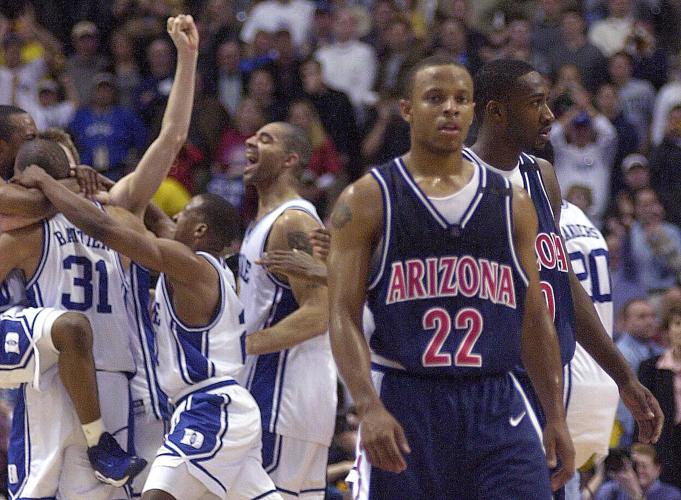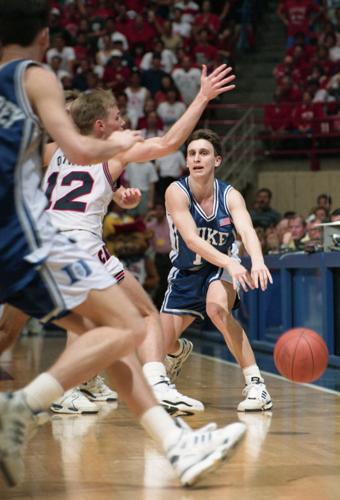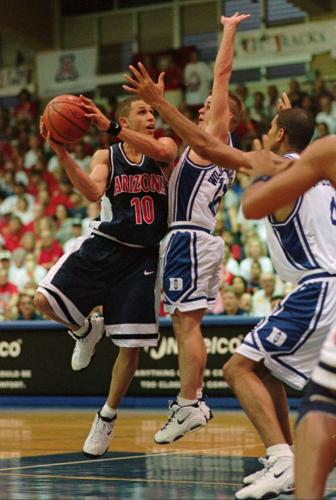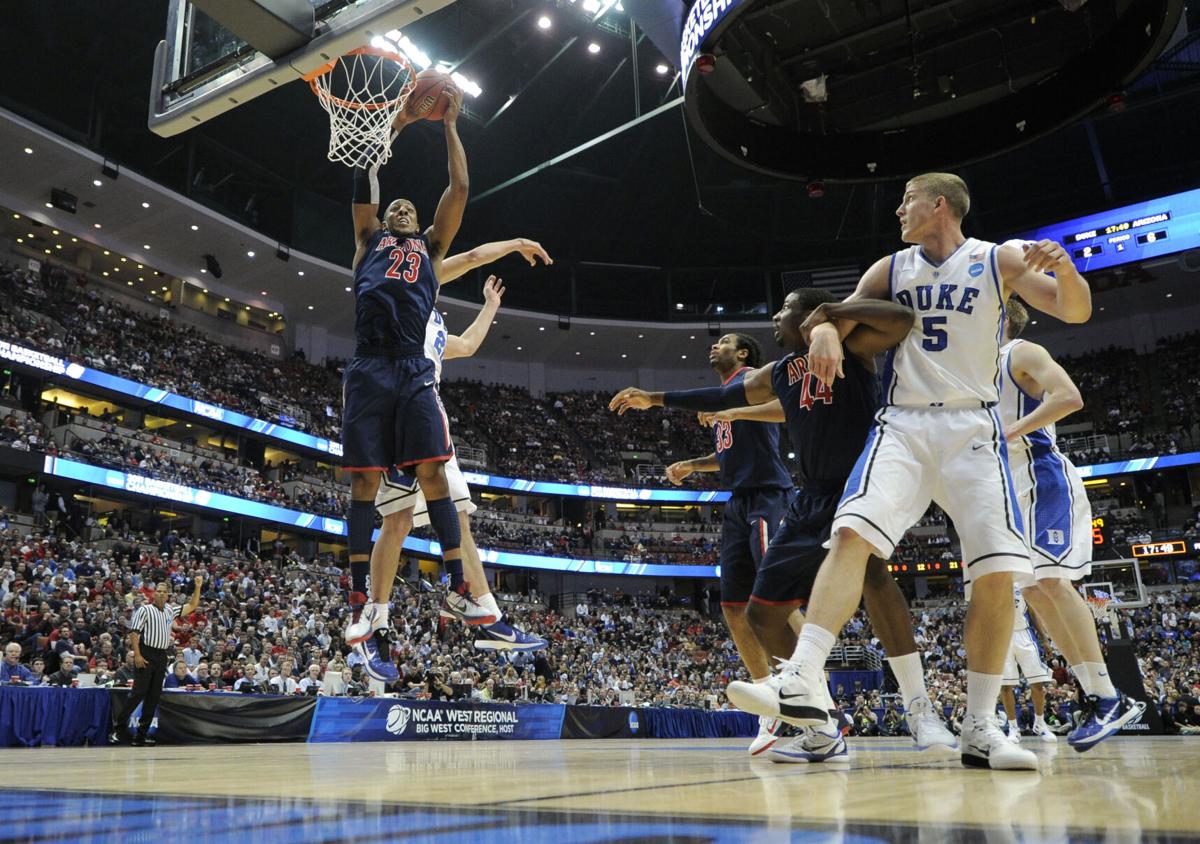Even before Duke’s Jay Williams rode the back of Arizona’s Jason Gardner in the 2001 NCAA championship game without drawing a foul, things were already getting rough.
Not just in that title game, which Duke eventually won by 10 points. But maybe more so in the relationship between the Blue Devils and Wildcats, in the idea that two of college basketball’s most powerful programs, one in the East and one in the West, might actually agree to play each other every once in a while.
Last time it happened intentionally was during the 1990-91 season, when Arizona capped a two-year home-and-home series with Duke by beating the Blue Devils in double overtime at McKale Center, avenging a three-point loss a year earlier in Durham, North Carolina.
“I think everybody involved felt those two were terrific, terrific basketball games,” said then-UA associate head coach Jim Rosborough. “I mean, that double overtime game, if you were here, that was a hell of a basketball game. It was phenomenal. They had (Christian) Laettner, (Bobby) Hurley and probably five (NBA) draft choices.”

Arizona’s Jason Gardner and Gilbert Arenas walk off the court as Duke players celebrate the Blue Devils’ victory over the Wildcats in the 2001 men’s national championship game in Minneapolis.
Then, nothing, other than what randomly popped up in tournament events.
The Wildcats and Blue Devils discussed a four-year series to be played at both home and neutral sites in the years after 2001, but UA basketball radio analyst Ryan Hansen, who then worked with scheduling under former coach Lute Olson, said talks broke down when Duke insisted on starting the series at Durham and New York City.
“Lute would have done a four-year deal, but he wouldn’t go east in the first two years,” Hansen said.
It was a stalemate of sorts. Not necessarily bad blood — but nobody making sure it happened, either.
Rosborough saw it cycle over and over again, a rivalry going nowhere, and he still wonders exactly why.
“I don’t think there was any hatred necessarily, but maybe a little jealousy here or there,” said Rosborough, an assistant coach these days for the Pima College women’s basketball team. “I mean, here was Krzyzewski getting all this pub and so on and Lute was out here grinding away. (Olson) did a heck of a job at Iowa, then came in here and turned it around — and (Krzyzewski) was just kind of the golden boy of the sport. I don’t know if that grated on Lute, but that could be something up for conjecture possibly.”

Duke guard Bobby Hurley passes the ball around Arizona’s Matt Othick on Feb. 24, 1991 at McKale Center in Tucson.
It was also possible tension from their high-profile games simply bubbled over too much. Rosborough said Krzyzewski felt the officiating in UA’s double-overtime win at McKale was “kind of a homer deal,” while the Wildcats didn’t feel all that great about the way the whistle blew (or didn’t) in that 2001 game.
(Williams, at McKale working for ESPN during a College GameDay appearance in Tucson in 2015, even tweeted that his appearance on top of Gardner “was definitely a foul but I’m no ref.”).
“I have no doubt, and I know that other people on our staff felt, that it was just not a well-refereed game,” Rosborough said. “We just didn’t get a fair shake and a lot of it had to do with Krzyzewski being on the referees right from the start. I can remember looking down and he was just ragging those guys.”
Then, in the years that Sean Miller coached the Wildcats between 2009-10 and 2020-21, the issue became pretty much moot. During Krzyezewski’s final 13 seasons, Duke did not play a single campus game as part of a home-and-home nonconference series.

Arizona's Mike Bibby (10) finds his path to the basket blocked by Duke's Steve Wojciechowski (12) and Roshown McLeod during the championship game of the Maui Invitational Wednesday, Nov. 26, 1997, in Lahaina, Hawaii.
There was “really no mention of a series with Duke,” said Xavier special assistant Ryan Reynolds, who handled UA’s schedules under Miller. “At that time, Coach K wasn’t playing a lot of home-and-homes, mostly neutral games, and we were always trying to get traditional home-and-homes first.”
So it was, then. Arizona inked home-and-homes under Miller with teams such as Gonzaga, Clemson, Baylor, Texas Tech and Florida, but never Duke.
Over the decades, as a result, the question became one of the most vexing in Arizona basketball history: Why weren’t the Wildcats and Blue Devils playing each other?
Didn’t that 1991 classic add value to college basketball, on both coasts, to fans all over the country? Wouldn’t it make sense to match up again, for the benefit of players, fans, television executives and power ratings alike?
Everybody wins, right?
That was current UA coach Tommy Lloyd’s logic, after all. So, after finishing his first season coaching the Wildcats in 2021-22, he picked up the phone.

Despite practically tackling Arizona's Jason Gardner, Duke's Jay Williams wasn't called for a foul in the first half of the 2001 NCAA title game. The Blue Devils went on to win 82-72.
On the other end was former Blue Devil standout Jon Scheyer, who took over for the retiring Krzyzewski in 2022.
“I called Jon when he got the job, and I just thought it would be a great idea for both of us to play a game like this,” Lloyd said. “Scheduling in college basketball is getting harder and harder for whatever reason, so anytime you get an opportunity to get two programs of an Arizona and a Duke stature to meet on the others’ court, I think it’s pretty cool.”
It didn’t appear to be a long conversation. While Scheyer may have had coaches all over asking for a game or series with the Blue Devils, Lloyd said the two sides came together remarkably quickly, blocking out dates on their 2023-24 and 2024-25 calendars (Duke will play at McKale on Nov. 21 next season) before other commitments came up.
“I think it was pretty seamless,” Lloyd said. “I think we had one or two conversations and kind of handed off to the guys on our staff that handle that scheduling piece. It was an easy process. I wish they were all like that.”
It was easy because they had a relationship. Scheyer is 13 years younger than Lloyd, so much younger that Lloyd says he remembers coaching against Scheyer as a player, but grew to know him on the road recruiting or at other events.
“You know, as coaches, we’re probably around each other a lot more than people realize,” Lloyd said. “What he stepped into is pretty impressive at a young age. I think he’s doing an admirable job, and I think he’s going to have a great coaching career.”
By the time the series was announced in July 2022, both coaches cited deep respect for each other, while their schools coordinated publicity releases at the same time.
“I have tremendous respect for Tommy Lloyd and Arizona,” Scheyer said in Duke’s statement. “For our team, I’m grateful for what I know will be important early season tests. For our fans and for college basketball, it will be exciting to see these storied programs over the next two years come together in two of the greatest on-campus venues in the sport.”
The cold war was over.
Arizona and Duke will be playing basketball Friday, in an on-campus arena.
Arizona Basketball Postgame Press Conference | Tommy Lloyd | Nov. 6, 2023 (Arizona Athletics YouTube)









